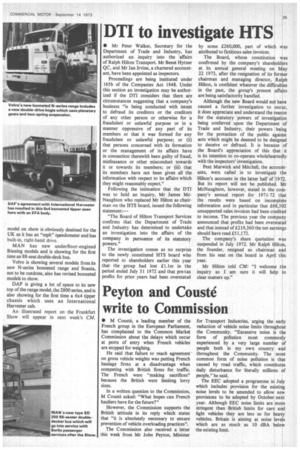Peyton and Couste write to Commission
Page 37

If you've noticed an error in this article please click here to report it so we can fix it.
• M Couste, a leading member of the French group in the European Parliament, has complained to the Common Market Commission about the delays which occur at ports of entry when French vehicles are stopped for weighing.
He said that failure to reach agreement on gross vehicle weights was putting French haulage firms at a disadvantage when competing with British firms for traffic. The French were "making sacrifices" because the British were limiting lorry sizes.
In a written question to the Commission, M Couste asked: "What hopes can French hauliers have for the future?"
However, the Commission supports the British attitude in its reply which states that "it is absolutely necessary to ensure prevention of vehicle overloading practices".
The Commission also received a letter this week from Mr John Peyton, Minister for Transport Industries, urging the early reduction of vehicle noise limits throughout the Community. "Excessive noise is the form of pollution most commonly experienced by a very large number of people both in my own country and throughout the Community. The most common form of noise pollution is that caused by road traffic, which constitutes daily disturbance for literally millions of people," he said.
The EEC adopted a programme in July which includes provision for the existing noise levels to be amended to allow new provisions to be adopted by October next year. Although EEC noise limits are more stringent than British limits for cars and light vehicles they are less so for heavy vehicles. Britain is aiming at noise levels which are as much as 10 dBA below the existing limit.




































































































































